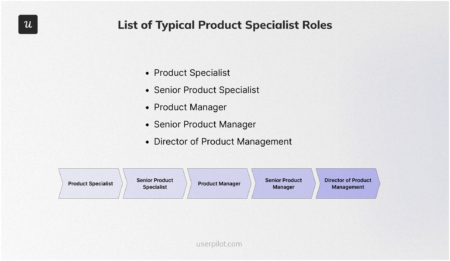![How to Become a Product Specialist [+Tools and Resources]](https://blog-static.userpilot.com/blog/wp-content/uploads/2024/06/How-to-Become-a-Product-Specialist-450x295.png)
Try Userpilot Now
See Why 1,000+ Teams Choose Userpilot

How to become a product specialist – quick summary
- A product specialist is a professional who is responsible for ensuring a product’s marketability and profitability.
- The exact career trajectory depends on an individual’s goals and company structure. Here’s what the typical career path of a product specialist in a company looks like:
- Product Specialist (0-1 years): Most professionals start their careers as entry-level product specialists, focusing on understanding the product and analyzing market trends. You’ll also gain hands-on experience addressing user needs and helping with onboarding.
- Senior Product Specialist (3-5 years): In this role, you’ll supervise a team of product specialists and other professionals. You’ll have to become an expert in certain aspects of the product and outline strategies to enhance those features.
- Product Manager (5-6 years): After gaining experience as a senior product specialist, you can transition into the role of a product manager. Here, you’ll work closely with the senior management and oversee the entire product lifecycle, from concept to delivery and beyond.
- Senior Product Manager (6-10 years): This is a leadership role that involves overseeing the entire product team. Also, you’ll be responsible for working with cross-functional teams to ensure product strategies align with business goals.
- Director of Product Management (10+ years): In this top-level product management role, you’ll work closely with other C-suite executives to shape the company’s product portfolio and strategies.
- If you want to pursue a career as a product specialist, the first step is to get a bachelor’s degree in business, computer science, marketing, or a related field. It’s the educational qualification that most companies list in their job descriptions.
- Also, it’s a good idea to gain professional experience in an entry-level marketing or sales role. For instance, you can pursue an internship in market research or work as a sales rep. These positions help you develop the skills you need to succeed as a product specialist. Examples include communication, logical thinking, and problem-solving.
- Pursuing an advanced degree, such as an MBA in a related field, can help take your career to the next level. Additionally, you should consider obtaining relevant certifications, such as Certified Product Manager (CPM) and Certified Product Marketing Manager (CPPM). These come in handy for moving to senior product management roles.
- While things look challenging, using the right tools can help product specialists simplify their jobs. Here are a few tools that can come in handy:
- Best tool for product growth: Userpilot – This full-stack digital adoption platform lets you design flawless in-app experiences for new users and secondary onboarding. Plus, you get several analytics tools and reports to monitor user behavior and engagement.
- Best tool for project management: Jira – The agile platform allows cross-functional teams to plan, monitor, and release top-notch products. Also, the platform uses AI to offer actionable suggestions based on your ideas.
- Best tool for product management: Wrike – The platform offers Kanban-style boards and automated workflows that facilitate remote collaboration. Product specialists can use it to collaborate with design, marketing, and sales teams to develop, implement, and monitor product strategies.
- Best tool for CX: Zoho Desk – The cloud-based help desk software by Zoho offers several features, including a ticketing system, customer portal, and reporting. Besides simplifying customer support, the tool is also designed to help team members in different departments collaborate on customer issues.
- Best tool for customer success: ChurnZero – This digital-first customer success platform helps product specialists gain in-depth customer insights. The software aggregates user data from various sources and helps monitor customer health.
- Best tool for UI/UX design: Figma – This widely-used UI design software helps create and test interfaces and collect feedback from users. Product specialists can use it to suggest enhancements to design and engineering teams.
- Best tool for data analytics: Power BI – This powerful data visualization software by Microsoft helps collect raw product data from various sources and turn it into actionable, interactive insights.
- Looking into tools for product specialists? Userpilot is an all-in-one product platform with engagement features and powerful analytics capabilities. Book a demo to see it in action!
What is a product specialist?
A product specialist is a professional who is responsible for ensuring a product’s marketability and profitability.
They combine in-depth product knowledge with a thorough understanding of user needs to drive continued product growth. They play a crucial role in aligning user expectations with product features and functionalities.
Product specialist’s main responsibilities
A product specialist acts as a liaison between product, marketing, sales, and customer support teams. Key responsibilities of a product specialist include:
- Research – They’re responsible for developing an in-depth understanding of a company’s product. Additionally, they have to analyze competing products to identify unaddressed gaps and growth opportunities. They also have to stay on top of user behavior and market trends.
- Collaboration – They must work with cross-functional teams to ensure that the product’s functionalities fulfill user needs. Also, they develop strategies to improve product adoption and help team members with their implementation.
- Feedback – They have to collect and analyze user feedback to identify ways to improve a company’s product offerings. Their insights are crucial to shaping the future direction of a product.
- Training – They’re responsible for educating customer support and sales teams about the product. Additionally, they train these team members to develop and implement strategies for improving user satisfaction and revenue.
- Customer interaction – They must engage in direct conversations with users to understand their needs and expectations.
Product specialist career path
The product specialist role offers ample opportunities to advance your career in different functions, such as product management and customer experience. You can even transition into leadership roles in marketing and sales.
Additionally, many product specialists leverage their experience to build their own SaaS products. Others choose to launch consultancy firms where they help SaaS businesses improve their product offerings.
The exact career trajectory depends on an individual’s goals and company structure. Here’s what the typical career path of a product specialist in a company looks like:
- Product Specialist (0-1 years): Most professionals start their careers as entry-level product specialists, focusing on understanding the product and analyzing market trends. You’ll also gain hands-on experience addressing user needs and helping with onboarding.
- Senior Product Specialist (3-5 years): In this role, you’ll supervise a team of product specialists and other professionals. You’ll have to become an expert in certain aspects of the product and outline strategies to enhance those features.
- Product Manager (5-6 years): After gaining experience as a senior product specialist, you can transition into the role of a product manager. Here, you’ll work closely with the senior management and oversee the entire product lifecycle, from concept to delivery and beyond.
- Senior Product Manager (6-10 years): This is a leadership role that involves overseeing the entire product team. Also, you’ll be responsible for working with cross-functional teams to ensure product strategies align with business goals.
- Director of Product Management (10+ years): In this top-level product management role, you’ll work closely with other C-suite executives to shape the company’s product portfolio and strategies.
How to become a product specialist?
If you want to pursue a career as a product specialist, the first step is to get a bachelor’s degree in business, computer science, marketing, or a related field. It’s the educational qualification that most companies list in their job descriptions.
Also, it’s a good idea to gain professional experience in an entry-level marketing or sales role. For instance, you can pursue an internship in market research or work as a sales rep. These positions help you develop the skills you need to succeed as a product specialist. Examples include communication, logical thinking, and problem-solving.
Pursuing an advanced degree, such as an MBA in a related field, can help take your career to the next level. Additionally, you should consider obtaining relevant certifications, such as Certified Product Manager (CPM) and Certified Product Marketing Manager (CPPM). These come in handy for moving to senior product management roles.
While you’re getting the necessary experience and qualifications, it’s also crucial to build your professional network. Start by identifying a sector or an industry, such as retail, SaaS, or healthcare, in which you want to specialize. Next, attend relevant industry events and join product associations to find new opportunities.
What skills should a product specialist have?
Let’s take a look at the must-have skills for the product specialist role:
- Communication – A good product specialist must have the ability to convey their ideas and thoughts to coworkers clearly. Plus, they should be adept at interacting with customers and extracting relevant insights from these conversations.
- Problem-solving – Besides identifying potential challenges, product specialists should also have the ability to identify quick and effective resolutions. They should be able to suggest improvements and new ideas to address user pain points.
- Product knowledge – Every product specialist must have a firm understanding of a company’s entire product line. They should look beyond available features and use cases to understand how the user journey works and what pain points it addresses.
- Data analysis – From user feedback and product metrics to market trends, product specialists have to make sense of different types of data. They should also be able to extract actionable insights from it.
- Product management – A good product specialist should be well-versed in market research, A/B testing, and agile methodology. Critical thinking, decision-making, and prioritization are also essential skills.
- Knowledge of tools – To do your job well as a product specialist, you should be well-versed in tools like Jira and Power BI that can help you manage product development and understand customer preferences.
Best certifications for product specialist
Product specialists, in particular, benefit from a broad range of skills that span product management, sales, marketing, and technical knowledge. The right certifications not only validate your skills but also provide you with the latest industry knowledge and best practices. Here are some of the top certifications valuable for product specialists:
Product Management Certifications (Valuable for Product Specialists):
- Certified Product Manager (CPM) (Product School): This certification is well-regarded and covers core product management principles. While PCM is often mentioned in the context of product managers, foundational product knowledge is crucial for product specialists.
- Professional Certificate in Product Management (UC San Diego Extension): This university extension program offers a broader product management foundation. It can enhance your understanding of the product lifecycle, which is valuable for product specialists.
Sales & Marketing Certifications (Valuable for Product Specialists):
- HubSpot Sales Hub Certification (HubSpot Academy): Product specialists often interact with sales teams. This certification equips you with sales methodologies and tools used by HubSpot, a popular CRM platform.
- Google Digital Marketing Certification (Google): Understanding core digital marketing concepts is valuable for product specialists who might support product launches or marketing initiatives. This free Google certification equips you with those fundamentals.
Technical Certifications (Depending on Product Focus):
- Industry-Specific Certifications: There might be product-specific certifications relevant to your field (e.g., AWS Certified Solutions Architect for tech products). Look for associations or training programs focused on the technical aspects of products within your domain (varies).
Best resources for product specialists
It’s now time for us to outline a few blogs, podcasts, and other resources that’ll help product specialists develop their skills and advance their careers. Let’s get right to it.
Best books for product specialists
- Inspired: How to Create Tech Products Consumers Love by Marty Cagan – This book spills the beans on creating customer-centric products that solve real-life problems.
- Hooked: How to Build Habit-Forming Products by Nir Eyal – If you’re looking for insights into user psychology and what goes into addictive product experience, this is the book for you.
- The Influential Product Manager by Ken Sandy – This book covers several tools and strategies you need to thrive in a product management role.
- Product-Led Growth: How to Build a Product That Sells Itself by Wes Bush – This book digs deep into various aspects of product-led growth, from minimizing churn to improving user activation.
- Start at the End: How to Build Products That Create Change by Matt Wallaert – This book uses the principles of behavioral science to put a spin on the traditional way of brainstorming new product ideas.
You can find these books on Amazon and eBay.
Best webinars for product specialists
The success of any product hinges on understanding your users and staying on top of the latest trends. So here comes a list of helpful resources for every product specialist:
- Userpilot – Find live and on-demand webinars on various aspects of product management, from user onboarding and behavior analytics to product launch.
- Gartner – Discover webinars on cutting-edge topics, including the impact of generative AI on product management.
- Product School – Join conferences, fireside chats, panel discussions, and more with experts from companies like Google and Meta.
- Product Focus – Find a bunch of free live webinars and recordings to discover best practices and new ideas.
- Chameleon – Discover live and on-demand webinars on product-related topics, with a focus on customer-centricity.
Best blogs for product specialists
- Userpilot’s blog features a ton of articles on product adoption, experience, and growth.
- The Product Guy Blog by Jeremy Horn offers a deep dive into challenges, practical strategies, and industry trends.
- ProductPlan’s blog is an excellent starting point for anyone who is new to product management.
- Product Coalition covers a broad spectrum of insights from product professionals.
- Inside Intercom features articles on all things product, from management and strategy to roadmap.
Best podcasts for product specialists
- Fearless Product Leadership by Hope Gurion – Learn the secrets to leading product teams with confidence; available on Apple and Spotify.
- Product People – Take a deep dive into eye-opening conversations with industry experts; available on Apple and Spotify.
- Product Hunt Radio by Ryan Hoover and Abadesi Osunade – Entrepreneurs, investors, and product makers come together to discuss the current landscape and future of product management; available on Apple and Spotify.
- Beyond the To-Do List by Erik Fisher – Business leaders, authors, and other experts share advice on strategy and productivity; available on Apple and Spotify.
- 100 PM by Suzanne Abate – Insightful interviews of product managers from leading companies, including Expedia, Sonos, and more; available on Apple.
Best tools for product specialists
A product specialist is responsible for several tasks, from collecting user feedback to training team members. Also, they have to work with marketing teams to identify emerging trends and adapt product strategies accordingly.
While things look challenging, using the right tools can help product specialists simplify their jobs. Here are a few tools that can come in handy:
- Best tool for product growth: Userpilot – This full-stack digital adoption platform lets you design flawless in-app experiences for new users and secondary onboarding. Plus, you get several analytics tools and reports to monitor user behavior and engagement.
- Best tool for project management: Jira – The agile platform allows cross-functional teams to plan, monitor, and release top-notch products. Also, the platform uses AI to offer actionable suggestions based on your ideas.
- Best tool for product management: Wrike – The platform offers Kanban-style boards and automated workflows that facilitate remote collaboration. Product specialists can use it to collaborate with design, marketing, and sales teams to develop, implement, and monitor product strategies.
- Best tool for CX: Zoho Desk – The cloud-based help desk software by Zoho offers several features, including a ticketing system, customer portal, and reporting. Besides simplifying customer support, the tool is also designed to help team members in different departments collaborate on customer issues.
- Best tool for customer success: ChurnZero – This digital-first customer success platform helps product specialists gain in-depth customer insights. The software aggregates user data from various sources and helps monitor customer health.
- Best tool for UI/UX design: Figma – This widely-used UI design software helps create and test interfaces and collect feedback from users. Product specialists can use it to suggest enhancements to design and engineering teams.
- Best tool for data analytics: Power BI – This powerful data visualization software by Microsoft helps collect raw product data from various sources and turn it into actionable, interactive insights.
Product specialist FAQs
- Is product specialist a good role?
Pursuing a career as a product specialist offers an opportunity to combine technical knowledge with client interaction and strategic thinking. The role is in high demand across various industries, from healthcare and tech to consumer goods. It’s particularly suitable for individuals looking to build a career in product management or move to sales leadership roles.
- How do you become a product specialist?
Most companies require product specialists to have a bachelor’s in business, computer science, marketing, or a related field. Besides getting the necessary qualifications, it’s also a good idea to gain professional experience through entry-level roles in market research, sales, product, or customer-facing teams.
- What is a product specialist vs. a product manager?
A product specialist is responsible for analyzing market trends and competitor products. They collaborate with other teams to build strategies that ensure the product’s marketability and profitability.
On the other hand, a product manager works with design and engineering teams to get a product ready for users. They’re responsible for identifying must-have features and functionalities based on customer needs. A product specialist with enough experience can go on to become a product manager.
- What is the role of a product specialist?
A product specialist is responsible for ensuring that a product meets user needs and retains a competitive position in the market. They work with other teams, such as design, marketing, and sales, to identify ways to improve the product and ensure its marketability. They play a crucial role in driving a product’s continued growth.
Coclusion
Becoming a successful product specialist requires dedication, continuous learning, and a proactive approach to developing relevant skills.
By following the outlined steps and leveraging the resources available, you can effectively navigate your career path and achieve your professional goals.
We hope this guide has provided you with valuable insights and practical advice to help you on your journey to becoming a proficient and impactful product specialist!
Looking into tools for product specialists? Userpilot is an all-in-one product platform with engagement features and powerful analytics capabilities. Book a demo to see it in action!








